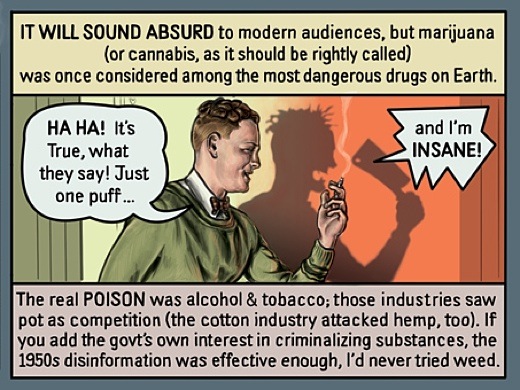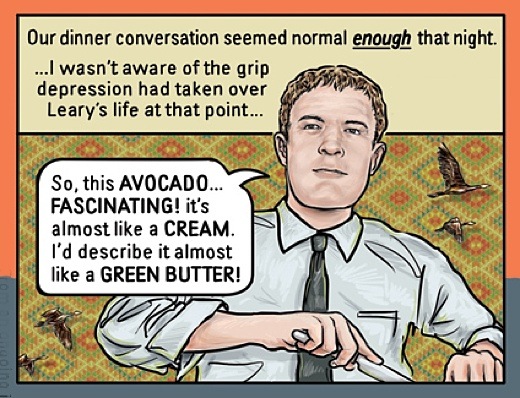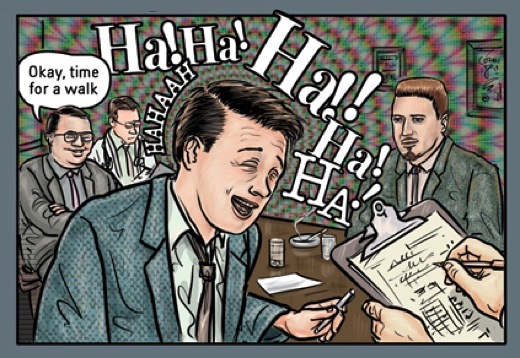SUBHEAD: Time with Timothy Leary, Mexico, Magic Mushrooms, and Reefer Madness.
By Ethan Persoff and Scott Marshall on 21 November 2013 for Boing Boing -
(http://boingboing.net/2013/11/21/john-wilcock-participating-in.html)
[IB Publisher's note: This is a three part comic graphic illustrated story published by Boing Boing that looks back on the early 1960s and a New York writer's first introduction to psychedelic drugs.
THE STORY: Part 1
While on an assignment John Wilcock meets an enthusiastic Timothy Leary, wearing red socks, in Cuernavaca, Mexico.

Image above: Detail from Reefer madness Part 1. Click for full page. From (http://boingboing.net/2013/11/07/john-wilcock-timothy-leary-m.html).
THE STORY: Part 2
Witnessing a dinner with a spacey Timothy Leary and his fascination with avocados (green butter) and bananas (joyous miracle).

Image above: Detail from Reefer madness Part 2. Click for full page. From (http://boingboing.net/2013/11/14/john-wilcock-witnessing-tim-l.html).
THE STORY: Part 3
John Wilcock concludes with an invitation to participate in the Harvard Psilocybin Project - the road to ruin that ultimately leads John to pot.

Image above: Detail from Reefer madness Part 3. Click for full page. From (http://boingboing.net/2013/11/21/john-wilcock-participating-in.html).
Adventure with a Pink Pill
By John Wilcock on 6 September 1962 for The Village Voice -
(http://boingboing.net/2013/11/21/john-wilcock-participating-in.html)
[Boing Boing Editior's note: As an added treat to this final comic tale, here's John's original column on participating in the Harvard Psilocybin Project, from 1962.]
A questionnaire arrived last month from Tim Leary, a professor at Harvard who has been doing research on the effects of Mexico's "magic mushrooms" (teonanacati) on human consciousness. The mushrooms, foundation of some Indian religions, have been synthesized commercially into psilocybin, a small pink pill, and Tim Leary's Harvard group has been testing them on people and noting the effects.
I tried psilocybin about a year ago and reported on the enjoyable and highly euphoric effects. What Dr. Leary wanted to know now was whether there had been any permanent effects or changes in my life as a result. I was able to tell him (as, apparently, 62 percent of his subjects have told him) that my life had changed for the better.
It's always difficult to evaluate what effect a single action has had upon the course of one's life, and to what extent the normal maturing process is responsible, but it's true to say that in the past year I have become happier, more tolerant, less compulsive, and much more of a PARTICIPANT in virtually every phase of activity. I enjoy everything more these days, often with the sort of hearty abandon that wouldn't have been possible at one time in my life.
The simplest things -- reading the newspapers, listening to jazz on the radio, stopping for a hamburger, taking a bubble bath, kissing a girl -- fill me with tremendous anticipation and pleasure. I have become in love with the whole world, while at the same time retaining a healthy contempt for cruelty, greed, inhumanity, and the terrible things that people and countries do to each other.
It would be very unscientific, and potentially dangerous, to believe that these effects came solely from psilocybin, of course, but I do have a suspicion that that one afternoon's experience, coming at a particular time of my life, helped along what would possibly have been a natural course of events.
And I take my cue from a statement by Leary's group (the Center for Research in Personality):
...In a meeting with representatives of the Food and Drug Administration, which has been kept informed of his research, Dr. Leary's group reported:
And a compilation of reports from 98 of the 157 people who tried psilocybin reveals that 70 percent found the experience pleasant; 87 percent learned something new about themselves and the world; 62 percent report it changed their lives for the better; and 90 percent want to try it again. Leary's initial experiments are now concluded, and he has none of the drug available.
FOOTNOTE BY DR. LEARY:
The most important single factor that determines whether a person undergoes a heavenly or hellish experience is his expectancy. If, for example, he takes one of these drugs in a hospital setting, where his contract is to behave as a subject in a scientific experiment and where his every move is carefully watched and noted by attending doctors and psychiatrists, he will almost certainly manifest psychiatric symptoms.
On the other hand, if the drug is taken together with a group of close, loving friends in a warm, familiar environment and the expectancy is to have a joyful, intellectual experience, then the chances for this to happen are very good.
However, if the scene is rebellious or secretive -- fear of being caught by the police, guilt of pleasure, sense of doing something shady and illicit -- the chances are that all these things will become magnified out of all proportion.
COMIC CREDITS:
John Wilcock: Author and experimental psychedelic guinea pig will continue with additional chapters of this story in a few months. John still writes a terrific column of news and opinion, posted every week at www.johnwilcock.net.
Ethan Persoff (Twitter) is an archivist, sound artist and cartoonist. His other new comics project is RADIO WIRE.
Scott Marshall (Facebook) is an illustrator, sound artist, and art director, based in New York City. Previous projects include audio work for Woody Allen (Small Time Crooks), and the score for a full-length dance piece by choreographer Lar Lubovitch (Men's Stories).
See also:
Island Breath: Tales from The Tube 11/29/08
(Psychedelic surf comic by Rick Griffin in 1971 Surfer Magazine)
.
By Ethan Persoff and Scott Marshall on 21 November 2013 for Boing Boing -
(http://boingboing.net/2013/11/21/john-wilcock-participating-in.html)
[IB Publisher's note: This is a three part comic graphic illustrated story published by Boing Boing that looks back on the early 1960s and a New York writer's first introduction to psychedelic drugs.
THE STORY: Part 1
While on an assignment John Wilcock meets an enthusiastic Timothy Leary, wearing red socks, in Cuernavaca, Mexico.

Image above: Detail from Reefer madness Part 1. Click for full page. From (http://boingboing.net/2013/11/07/john-wilcock-timothy-leary-m.html).
THE STORY: Part 2
Witnessing a dinner with a spacey Timothy Leary and his fascination with avocados (green butter) and bananas (joyous miracle).

Image above: Detail from Reefer madness Part 2. Click for full page. From (http://boingboing.net/2013/11/14/john-wilcock-witnessing-tim-l.html).
THE STORY: Part 3
John Wilcock concludes with an invitation to participate in the Harvard Psilocybin Project - the road to ruin that ultimately leads John to pot.

Image above: Detail from Reefer madness Part 3. Click for full page. From (http://boingboing.net/2013/11/21/john-wilcock-participating-in.html).
Adventure with a Pink Pill
By John Wilcock on 6 September 1962 for The Village Voice -
(http://boingboing.net/2013/11/21/john-wilcock-participating-in.html)
[Boing Boing Editior's note: As an added treat to this final comic tale, here's John's original column on participating in the Harvard Psilocybin Project, from 1962.]
A questionnaire arrived last month from Tim Leary, a professor at Harvard who has been doing research on the effects of Mexico's "magic mushrooms" (teonanacati) on human consciousness. The mushrooms, foundation of some Indian religions, have been synthesized commercially into psilocybin, a small pink pill, and Tim Leary's Harvard group has been testing them on people and noting the effects.
I tried psilocybin about a year ago and reported on the enjoyable and highly euphoric effects. What Dr. Leary wanted to know now was whether there had been any permanent effects or changes in my life as a result. I was able to tell him (as, apparently, 62 percent of his subjects have told him) that my life had changed for the better.
It's always difficult to evaluate what effect a single action has had upon the course of one's life, and to what extent the normal maturing process is responsible, but it's true to say that in the past year I have become happier, more tolerant, less compulsive, and much more of a PARTICIPANT in virtually every phase of activity. I enjoy everything more these days, often with the sort of hearty abandon that wouldn't have been possible at one time in my life.
The simplest things -- reading the newspapers, listening to jazz on the radio, stopping for a hamburger, taking a bubble bath, kissing a girl -- fill me with tremendous anticipation and pleasure. I have become in love with the whole world, while at the same time retaining a healthy contempt for cruelty, greed, inhumanity, and the terrible things that people and countries do to each other.
It would be very unscientific, and potentially dangerous, to believe that these effects came solely from psilocybin, of course, but I do have a suspicion that that one afternoon's experience, coming at a particular time of my life, helped along what would possibly have been a natural course of events.
And I take my cue from a statement by Leary's group (the Center for Research in Personality):
"We have come to believe that psilocybin has the potential to facilitate for an individual the experience of major insights and problem solutions of an intellectual-emotional nature... It is also our conviction that these insights, enlightenment, or solutions provide a firm educational foundation for change in the social or intellectual behavior of the individual."
...In a meeting with representatives of the Food and Drug Administration, which has been kept informed of his research, Dr. Leary's group reported:
"We are convinced that these substances can contribute to human welfare in many ways -- in psychiatry and other forms of social rehabilitation, in creative industry, in education, in defense enterprises, in artistic and cultural pursuits."
And a compilation of reports from 98 of the 157 people who tried psilocybin reveals that 70 percent found the experience pleasant; 87 percent learned something new about themselves and the world; 62 percent report it changed their lives for the better; and 90 percent want to try it again. Leary's initial experiments are now concluded, and he has none of the drug available.
FOOTNOTE BY DR. LEARY:
The most important single factor that determines whether a person undergoes a heavenly or hellish experience is his expectancy. If, for example, he takes one of these drugs in a hospital setting, where his contract is to behave as a subject in a scientific experiment and where his every move is carefully watched and noted by attending doctors and psychiatrists, he will almost certainly manifest psychiatric symptoms.
On the other hand, if the drug is taken together with a group of close, loving friends in a warm, familiar environment and the expectancy is to have a joyful, intellectual experience, then the chances for this to happen are very good.
However, if the scene is rebellious or secretive -- fear of being caught by the police, guilt of pleasure, sense of doing something shady and illicit -- the chances are that all these things will become magnified out of all proportion.
COMIC CREDITS:
John Wilcock: Author and experimental psychedelic guinea pig will continue with additional chapters of this story in a few months. John still writes a terrific column of news and opinion, posted every week at www.johnwilcock.net.
Ethan Persoff (Twitter) is an archivist, sound artist and cartoonist. His other new comics project is RADIO WIRE.
Scott Marshall (Facebook) is an illustrator, sound artist, and art director, based in New York City. Previous projects include audio work for Woody Allen (Small Time Crooks), and the score for a full-length dance piece by choreographer Lar Lubovitch (Men's Stories).
See also:
Island Breath: Tales from The Tube 11/29/08
(Psychedelic surf comic by Rick Griffin in 1971 Surfer Magazine)
.
No comments :
Post a Comment